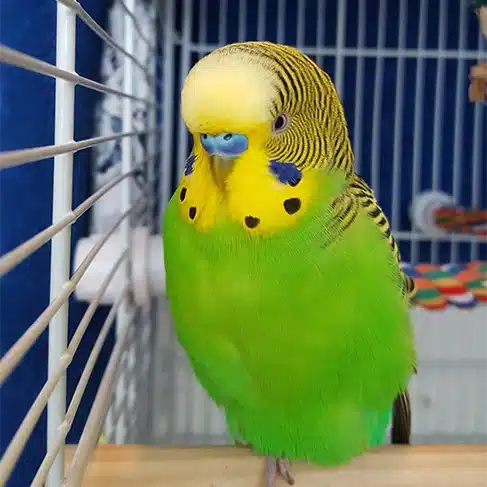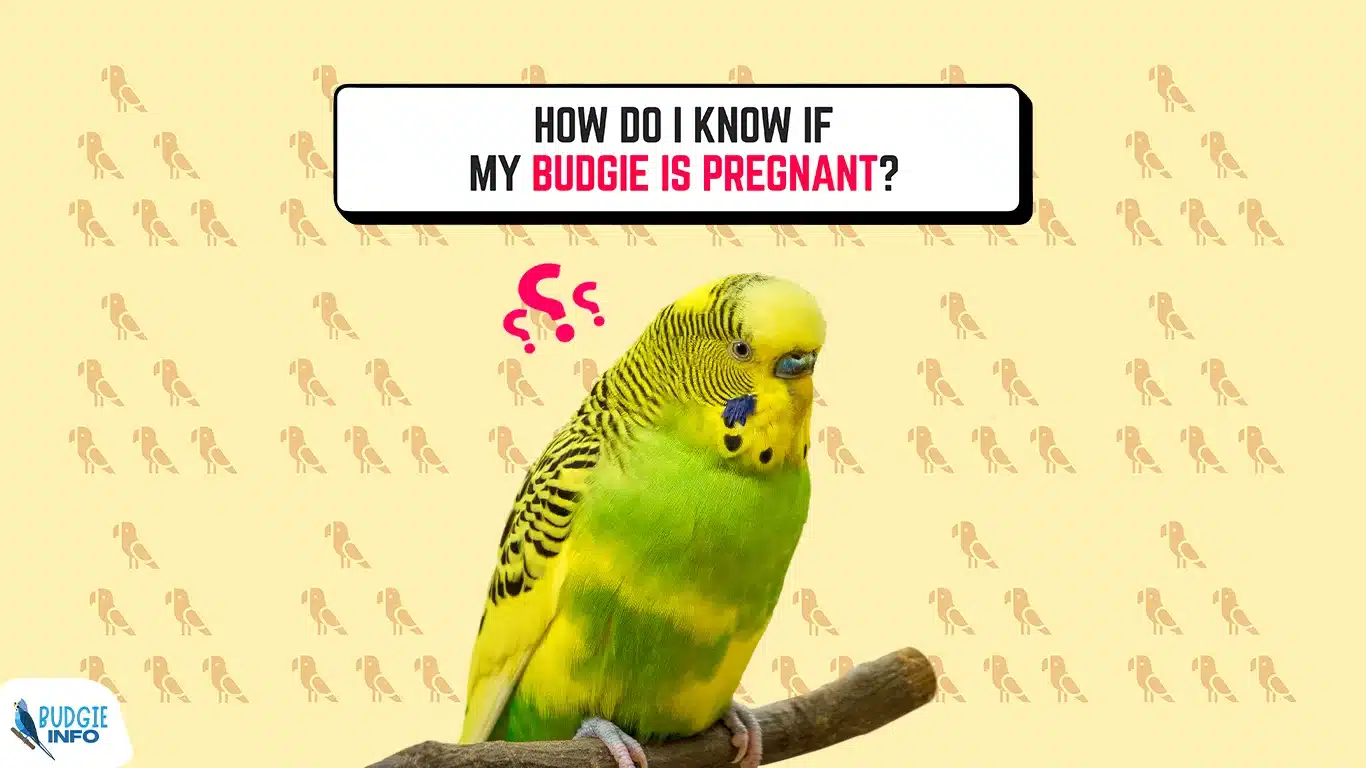I would like to state one thing first, budgies do not get pregnant. They lay eggs only because they are Oviparous. This means their eggs develop and hatch outside their body.
However, there are some signs of egg laying that will let you know that your budgie is gravid or carrying eggs.
In this article, I’ll talk about these signs. So let’s start with the first one:
1. A Small Swelling in the Belly
When your budgie is ready to lay eggs, you may notice her belly looks a bit swollen. This means she’s gravid, or carrying eggs.
The swelling comes from the eggs growing inside her. Typically it’s small and doesn’t bother her.
Moreover, research on bird reproduction shows these belly changes are normal in egg-laying bird species. It’s how their body gets ready to make eggs. So, look for this sign, but also check it’s not a health issue!
2. Weight Gain is a Sign
When a budgie is expecting, she usually gains some weight. It’s a natural part of her body that is prepared for laying eggs.
The weight gain is because of the eggs growing inside her. She might also eat more than usual.
Bird experts have observed that female birds can get up to 30% heavier in the breeding season. However, this weight gain is from both the eggs and extra nutritional reserves. So if you see your budgie heavier, she might be getting ready to lay eggs.
3. Color of Their Cere Changes
The color of their cere can change when they’re laying eggs. The cere is the soft area above the beak where their nostrils are located. In female budgies ready to breed, hormones can make this area turn brownish or tan.
However, this color change is due to higher estrogen levels in budgies that are ready to lay eggs. Studies on bird hormones confirm this. So, keep an eye on this area for any notable changes.
4. Look for a Brooding Patch
Look out for a brooding patch on your budgie. This is a featherless spot on her belly. It forms to help warm the eggs better, due to hormone changes.
Studies on bird incubation show how important this brood patch is for hatching eggs. So, if you see a featherless area on your budgie’s belly, it’s a big sign she might be laying eggs.
5. They Could Eat More
When a budgie is expecting a baby she eats more than usual. It’s not just a random craving!
When a female budgie is ready to lay eggs they need more food. They need more calories and nutrients for the eggs.
Related Post: Budgie Diet: Complete Feeding Guides for Budgies.
However, research shows that birds need a balanced diet. During this period, they need lots of calcium and protein. So, if your budgie consumes more cuttlebone, pellets, fresh vegetables, fruits, and various seeds then she is likely preparing to become a mother.
6. Their Droppings Are Larger
If your budgie is about laying eggs you will notice a bit changes in their droppings. These changes in the size and frequency of droppings are important health indicators. Furthermore, bigger droppings happen because she eats more and her body is changing.
Vet studies say, checking droppings is a good way to see if a bird is healthy. This is especially true during breeding times. So, keep an eye on these signs. They tell you a lot about your budgie’s health during this special time.
7. They Act More Defensive
When your budgie is about laying eggs, she may act more defensively. This change is her natural instinct to protect her eggs and future chicks.
Research on bird behavior finds this is common in many birds during breeding season. They get more territorial and guard their nesting area more.
8. They Spend More Time Near the Nest
If your budgie is ready to lay eggs, she will spend more time near her nesting box. Because she is preparing it for her eggs. This is her instinct to make a safe, comfy place for laying eggs and raising her chicks.
So, seeing your budgie near her nest more often is a big sign that she’s getting ready to be a mom.
9. You Can See Changes in Activity Levels
If your budgie’s activity level changes, it’s normal. For instance, some may get more active, while others might slow down. This happens because of body and hormone changes during their egg-laying cycle.
These ups and downs are usual, as bird physiology studies show. They can be influenced by their diet, where they live, and their health. So look for these changes, as they’re a normal part of their cycle. Especially when they’re getting ready to lay eggs.
However, noticing these signs can be a bit difficult task for you. But you can take the help of an expert vet to identify whether your budgie is ready to lay eggs or not.
How Do You Care For a Prgenant Budgie?
Caring for a pregnant budgie means creating a cherished environment for her during this special time. So, let’s break down some key ways to give your feathered friend the best care she needs.
Give a Healthy Diet
If your budgie is ready to lay eggs, you have to think twice about her diet. Because it is really important for her health and her future chicks. So, provide a mixture of seeds, pellets, fresh vegetables, and fruits.
With this, give her cuttlebone or mineral blocks which have great sources of calcium. However, this calcium helps a pregnant budgie’s eggs healthy and makes the shells strong.
Overall, you need to make sure she’s getting a balanced diet with lots of calcium and protein.
Ensure Your Budgie Has Access to Fresh Water
About hydration, there’s not much to say! We all know fresh water is important for us and for them. So, always give your budgie fresh and clean water. Change it every day to avoid contamination.
This easy step is crucial for your budgie’s health, especially when she’s pregnant.
Keep the Cage and Nesting Area Clean
If your budgie is going through an egg-lying period, you have to keep her cage and nesting area clean. This is important for her health and safety. So what you need to do is, clean the cage often, change the bedding materials, and keep the nesting box hygienic. This helps you to stop infections and make a restful condition for your budgie to lay eggs.
Keep the Cage in a Quiet, Calm Area
Want to do a big favor for your budgie during this special time? Simply make a calm environment for her.
She needs peace during this sensitive time. Put her cage in a quiet place in your home, away from loud noises and disturbances. This will lower her stress and help to concentrate on laying and caring for her eggs. Finally, it is a great help for both of you.
Put a Nest Box in the Cage
Set up a nest box for your budgie that is ready to lay eggs. It gives her a private and safe spot to lay eggs and care for her chicks. So, make sure the box is big enough, comfy, and easy for her to get into. It’s like making a warm and comfortable nursery for her babies that will arrive soon!
Minimize Handling
You have to reduce the handling of an egg-laying budgie. While it’s tempting to check on her often but too much interaction can be stressful for her. So give her the space she needs to relax and feel secure. As a result, she will appreciate having some peace during this time.
How Long Does It Take A Budgie To Get Pregnant?
Usually, female budgies are ready to lay eggs when they’re about 6 to 12 months old. However, just because they can lay eggs, they shouldn’t breed so young. Considering their health, it’s better to wait until they’re about a year old before breeding.
Now you might be asking, “Do budgies have any favorite time to breed?”
Yes, they have!
In the wild, budgies breed when there’s a lot of food, like in spring and summer. This natural timing means that there’s enough food for the parents to feed their chicks.
Even though budgies can lay eggs at 6 months but talk to a vet first. You need to check if your budgie is healthy and ready to be a parent. So in this case, the vet helps you to ensure your budgie and her chicks will be fine.
How Many Eggs Do Budgies Lay First Time?
Let’s look at another part of budgie parenthood – egg laying. A budgie usually lays 2 to 8 eggs in her first clutch, often 4 to 6 eggs on average. But it can vary.
So what can you expect? Here’s a simple table to explain:
| Clutch Size | Frequency |
| 2-3 eggs | Less common |
| 4-6 eggs | Most common |
| 7-8 eggs | Rare, but possible |
This table gives you an idea of what to expect when your budgie first lays eggs. But each budgie is different. Her health, food, and home can change how many eggs she lays. So you have to keep these in mind while you help her in this exciting time.
What Do I Do If My Budgie Lays An Egg?
Here are the things that you need to follow when your budgie lays eggs:
- Make a calm nest for the female budgie
- Keep her cage quiet and warm for easy egg care
- Use a nest box with soft stuff like shredded paper or hay
- Provide a relaxed place for the budgie to sit on her eggs
- Keep the area around the cage peaceful
- Avoid loud sounds and too much activity
- Bear in mind that, stress is bad for her and the eggs
Be cautious when checking the eggs. Look at them to see if they’re okay. But don’t disturb your budgie too much. If any eggs are cracked or damaged, remove them gently.
Will Budgies Breed Without A Nesting Box?
While budgies can breed without a nesting box, however, it’s not the best scenario! Because a nesting box is important for breeding budgies. It gives them a secure and private place to lay and take care of their eggs.
However, a nesting box really affects a budgie’s breeding behavior. It boosts their natural instincts for nesting. It also makes a safe place for laying eggs and raising chicks. Without it, budgies might get stressed or feel unsafe. This can cause problems with laying eggs and keeping the chicks safe.
So, if you want to breed budgies, giving them a suitable nesting box is important.
Will Budgies Breed In A Cage?
Yes, budgies can breed in a cage. But there are a few important things to consider.
First, the cage must be big enough. It should have room for a nesting box and space for your budgies to move around easily.
The second is privacy. This is important especially when breeding budgies in a cage. They need a quiet and undisturbed spot to breed well. Also, think about how many birds are in the cage. Because too many can cause stress and fighting, which isn’t good for breeding.

I’m Shajid Rahman, a happy owner of 6 beautiful budgies. I take care of this website to share tips, fun facts, and care guides about these birds.
Whether you’re a budgie lover or considering one as a pet, you’ll find helpful info here! I love these cute creatures, so I made this blog for Budgerigar fans. You can expect to get reliable information based on my years of experience. More About Me →

